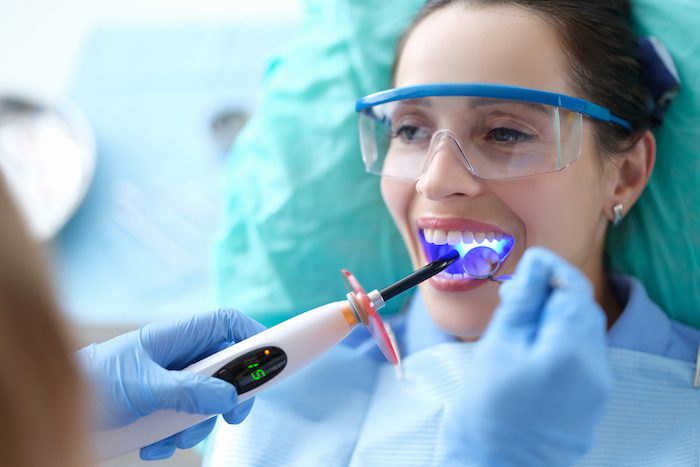Dental bonding is a popular way to correct minor cosmetic problems like chipped or worn-down teeth. Similar to porcelain veneers, it can treat various cosmetic issues. We offer it as one of our cosmetic dentistry services in Nederland, TX. It can improve both the aesthetics and function of your teeth.
Getting Teeth Bonding in Nederland, TX
We can usually complete 1-2 bonded teeth in one visit to our dentist office. First, we schedule a consultation where we review your medical history, do a visual exam, and possibly other diagnostic tests. We proceed to treatment once we ensure dental bonding is the best option for your issues.
Bonding requires very little tooth preparation. We just have to rough up the tooth’s surface so the bonding material adheres to it better. The bonding material can be any shade of white you desire. The batch is made specifically to be that color. The dentist molds the bonding material into the correct shape and size for your restoration. When you’re happy with the results, we use a special light to cure and harden the material. We then polish it to blend in with your teeth’s natural sheen.
Benefits of Dental Bonding
Teeth bonding comes with a variety of benefits. It’s one of the fastest dental procedures you can get. In most instances, your entire bonding procedure will be done in one visit to the office. It doesn’t require excessive tooth preparation or off-premise fabrication of restoration elements. You can have immediate results and improvement in your smile.
Bonding is popular because it’s non-invasive. For porcelain veneers or dental crowns, extensive tooth preparation is required before getting the restoration. Bonding only requires roughening the tooth’s surface. This restoration is fully removable if you don’t want it anymore. Because it’s so non-invasive and temporary, making it eligible for children’s treatment.
Teeth bonding is one of the most affordable dental treatments. It’s not time or labor-intensive, and the materials aren’t expensive. This makes it even more widespread because more patients can afford it. Even if they don’t have dental insurance, it’s not a cost that will break the bank account.
With bonding, you don’t need anesthesia, and we don’t have to use tools like dental drills. Patients with a fear of the dentist often feel comfortable getting bonding treatment. It’s a very low-risk procedure and comes with minimal complications. The resin we use is biocompatible, and patients rarely react to it. At the most, you may experience slight sensitivity. It should be minimal and not last more than a few days.
Caring for Bonded Teeth
Teeth bonding is a temporary solution that usually lasts 3-7 years. The probability of you experiencing this longevity increases with how well you take care of your oral health. The better you care for your teeth, the longer your dental restoration will last.
One of the biggest causes of concern with dental bonding is that the material becomes susceptible to staining. While they can resist some stains, they’re more likely to stain than restorations like porcelain veneers. Try to avoid smoking and drinking and eating things like coffee, tea, and strawberries. If you’re a big coffee drinker, use a straw to drink it so that it makes less contact with your teeth. This can help with the severity of the staining.
You should also avoid biting down directly with the bonded teeth. This is especially true for hard and chewy foods. Hard foods are more likely to break or crack the bonding, while sticky can pull the bonding material away from the tooth. Avoid habits like biting your nails or chewing ice, as both of these habits can harm the bonding material as well.
Frequently Asked Questions
We have answers to some of the most commonly asked questions about dental bonding.
Can bonded teeth get cavities?
Bonded teeth can still get cavities. The natural tooth structure underneath and around the bonding remains vulnerable to decay. This can happen at the margins where the bonding meets the tooth. Maintaining good oral hygiene is important to protect bonded teeth just like any other. So, don’t skip the brushing and flossing!
Does insurance cover tooth bonding?
Insurance coverage for tooth bonding depends on why you need the procedure. Insurance may partially or fully cover bonding if you need it to repair structural issues like chipped teeth. But if you’re getting bonding for cosmetic reasons, insurance usually won’t cover it. It’s best to check with your insurance provider to see what your plan includes.
Can I whiten my dental bonding?
No, dental bonding can’t be whitened like natural teeth. Whitening treatments don’t change the color of the bonding material. If your bonded teeth have discolored, the only way to brighten them is to replace the bonding entirely. It’s a good idea to whiten your natural teeth first, then match the new bonding to your brighter smile.
How many times have I had a dental bonding procedure?
There’s no strict limit to how often you can have a tooth bonding procedure. It can be repaired or replaced if the bonding wears down or gets damaged. However, each time bonding is redone, a small amount of tooth enamel might be removed. This could weaken the tooth over time. It’s important to talk with us to decide what’s best for your situation.
Can I use bonding instead of veneers?
Yes, you can use dental bonding instead of veneers in some cases. Bonding is less invasive and usually costs less. This makes it a good option for minor cosmetic fixes like small chips or gaps. However, veneers are more durable and offer a more significant change in appearance.
How many teeth can I have bonded at once?
A patient can have multiple teeth that can be bonded in one appointment. There’s no strict limit on the number. The number of teeth bonded depends on the individual case and the dentist’s recommendation. Most dentists can comfortably bond 2-4 teeth in a single visit. The procedure typically takes 30 minutes to an hour per tooth so that the total time will increase with more teeth.
Schedule an Appointment
Do you think that tooth bonding can correct your dental problems? Call us or schedule an appointment online.
